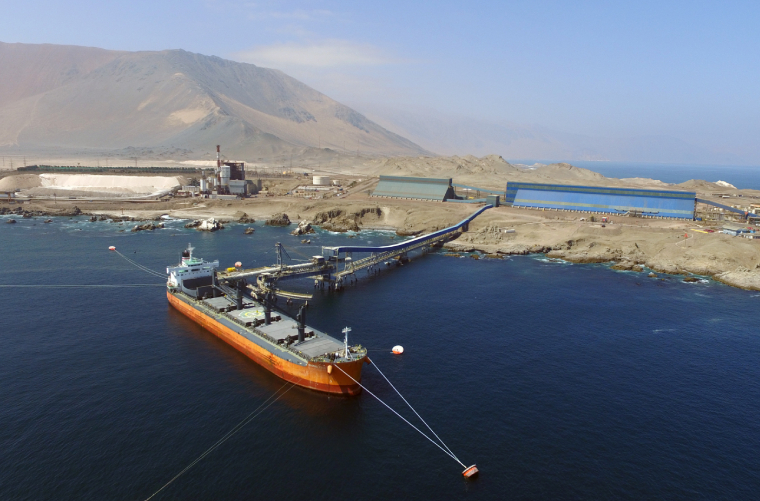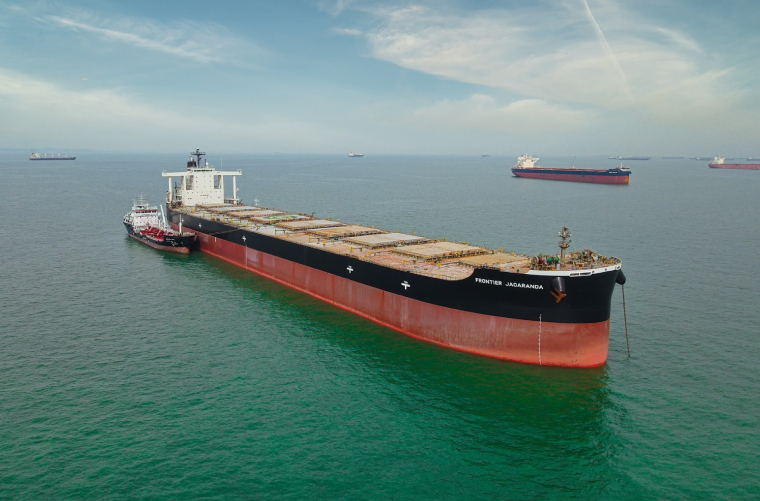By Peter Lye, Global Head of Shipping, Anglo American
The maritime sector underpins our modern lives, transporting some 11 billion tonnes of goods each year, including over 70 million tonnes of metals and minerals shipped from our mines – by our experienced, in-house shipping desk – to our customers around the world.
Although one of the most efficient forms of commercial transport, the sheer scale of the shipping sector means ocean freight accounts for nearly 3% of CO2 emissions globally1. With maritime trade expected to grow by 2.4% annually between 2022-262, full decarbonisation of international shipping by 2050 – the aim of a recent call to action initiated by the Global Maritime Forum and signed by more than 150 leaders from across the maritime value chain, including Anglo American – is vital to achieving the goal of limiting temperature increases to 1.5oC, as set out in the Paris Agreement and reaffirmed at COP26 in Glasgow at the end of 2021.
The high standards in vessel efficiency already attained across our chartered fleet, coupled with our diverse experience spanning multiple trade routes, means we are well-placed to help drive change. And with air pollutants from marine transport impacting our value chain emissions performance, the pursuit of carbon neutrality from our controlled ocean freight operations is a critical part of our Groupwide ambition to reduce our Scope 3 emissions by 50% by 2040.
To achieve this, we are leaning on a comprehensive suite of complementary measures, from our freight procurement strategies to investment in cutting-edge technology and alternative fuel solutions. Working collaboratively to establish a common, global baseline to quantitatively assess whether our chartering activities are in line with adopted climate goals is also key to these efforts.
To that end, in 2020 Anglo American became a founding signatory of the Sea Cargo Charter (SCC), which establishes a standard framework for the assessment and disclosure of shipping emissions. Transparent annual reporting via the SCC framework will drive accountability and transparency over our decarbonisation trajectory in this arena.
FUELLING THE TRANSITION
Alternative marine fuels have an important role to play on the journey, with a number of potential options being explored – from liquefied natural gas (LNG) and biofuel, to hydrogen and ammonia.
While the industry is coming together to accelerate the development of carbon neutral solutions, LNG, which benefits from an established network of existing infrastructure on key trading routes, has the advantage of being readily available. Compared to conventional fuel options, it can reduce CO2 emissions by approximately 35%, also eliminating sulphur oxides, and considerably reducing nitrogen oxides and particulate matter from vessel exhausts – with the uptake of bio-LNG and continued developments in synthetic LNG representing the potential for more ambitious outcomes in future.
Recognising the potential for immediate emission reduction offered by LNG, Anglo American is adding 10 new build LNG-fuelled capsize+ vessels to our chartered fleet. The vessels will be equipped with cutting edge technology designed to eliminate the release of unburnt methane (methane slip) and are due to be delivered in 2023 and 2024.
Biofuel is another emerging solution. In mid-2021, we successfully conducted our first trial using sustainable biofuel onboard the Frontier Jacaranda, a capesize bulk carrier owned by Japan’s NYK Line, in partnership with Singaporean firm, Alpha Biofuels. Encouraged by the results, this year we have started further trials in Singapore, with the aim of operationalising biofuel as part of our future fuel mix.
Hydrogen and ammonia have a promising future too. As an early supporter of the hydrogen economy, we have invested significantly in this arena as an organisation. We are partnering with Hydrogenious Maritime AS to explore the use of innovative Liquid Organic Hydrogen Carrier (LOHC) technology. By chemically bonding hydrogen to a diesel-like liquid with a high-storage density, which can be stored under ambient conditions (pressure and temperature), this partnership will help to propel hydrogen’s viability for marine transportation.
Ammonia, which emits no CO2 when combusted, has potential both as a fuel in its own right and as a hydrogen carrier. However, there is significant work that still needs to be done to ensure green ammonia is brought to market in a safe and sustainable way. To examine its prospects further, we have entered into a collaboration with Japan’s ITOCHU and other players to study possible solutions for more widespread adoption.
The work of this group will complement the various hydrogen economy initiatives Anglo American is involved in across our global business – specifically in Chile and South Africa – as will our participation in the Getting to Zero Coalition. This includes our engagement on the Coalition’s ‘South Africa: fuelling the future of shipping’ study, which explores the economic and environmental potential of implementing zero carbon shipping fuels in the country.
As well as bringing a maritime perspective to the various initiatives and programmes we are involved in, as a major vessel charterer we also bring commercial opportunity to the table, combined with a desire to ensure a transition that is just and equitable.
RESPECT FOR ALL PEOPLE
At Anglo American, we define a sustainable business as one with an enduring purpose in society, and which considers in all its decision-making the many different forms of value that it can deliver for all stakeholders.
As the Covid-19 pandemic has unfolded, the world's seafarers have borne the brunt of restrictions on movement. We have implemented a series of programmes onboard our chartered fleet – from supplying extra PPE, where appropriate, to conducting a mental health and wellbeing campaign to identify and support those affected, and providing care packages to crew members. We are now looking at supporting and safeguarding seafarer rights as a core part of our shipping activities.
As part of the taskforce of maritime stakeholders responsible for developing the Neptune Declaration on Seafarer Wellbeing and Crew Change, we were involved in identifying the key action areas to resolve the crew change crisis and to build a more resilient maritime supply chain. More than 850 companies have now signed the declaration, an important show of commitment and shared responsibility.
While there are undoubtedly headwinds to navigate, by taking collective action now, we can gain a common understanding of the challenges the sector faces, the opportunities ahead, and the solutions that will prove most effective in driving a more sustainable future, decarbonising the industry and our own value chains, and in meeting the world’s net zero ambition.
-----
1 ‘Environmental Performance: Comparison of CO2 Emissions by Different Modes of Transport’, International Chamber of Shipping, https://bit.ly/3t4uPsy
2 ‘Review of Maritime Transport 2021’ (P.19), United Nations Conference on Trade and Development (UNCTAD), https://bit.ly/3n3uG4N



